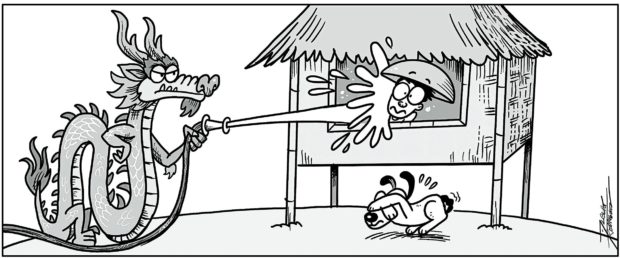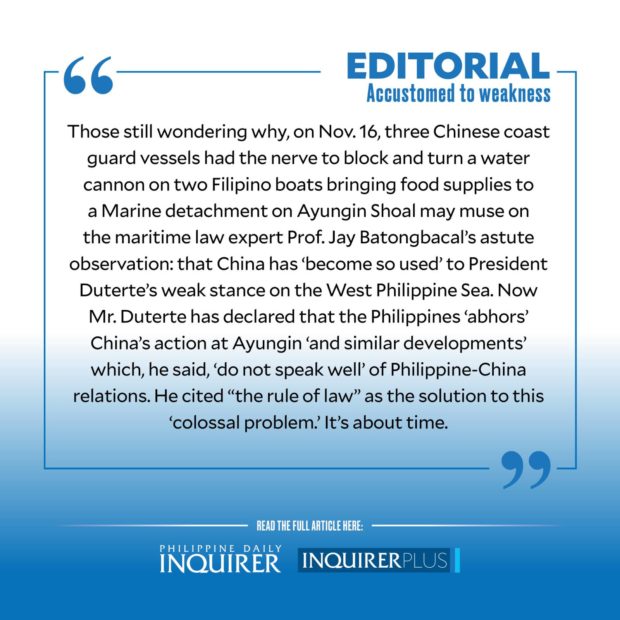Accustomed to weakness
Those still wondering why, on Nov. 16, three Chinese coast guard vessels had the nerve to block and turn a water cannon on two Filipino boats bringing food supplies to a Marine detachment on Ayungin Shoal may muse on the maritime law expert Prof. Jay Batongbacal’s astute observation: that China has “become so used” to President Duterte’s weak stance on the West Philippine Sea.
That weak stance comprised a constant declaration that there was no way the Philippines could go to war against China and an expression of impotence—“Inutil ako”—vis à vis such an undertaking, as though protesting encroachments on Philippine territory necessarily entailed waging war on the behemoth. The President’s memorable definition—a piece of paper fit for the waste bin—of the 2016 Arbitral Award that rejected China’s sweeping claim to the South China Sea including the West Philippine Sea has buttressed that weak stance, so that his occasional remarks upholding the award issued by the Permanent Court of Arbitration in The Hague came across as aberrations, as jokes.
But on Monday at the Asean-China special summit cohosted by Chinese President Xi Jinping and the current Asean chair, Brunei Sultan Hassanal Bolkiah, Mr. Duterte assailed China’s assault on the two wood-hulled supply boats en route to the World War II-vintage BRP Sierra Madre that serves as the Philippines’ outpost on Ayungin. Earlier, only Foreign Secretary Teodoro Locsin Jr. and Defense Secretary Delfin Lorenzana had issued expressions of outrage, and Malacañang through acting presidential spokesperson Karlo Nograles had simply said the government would not abandon its troops at the shoal. Mr. Duterte had been bafflingly silent despite China’s incredible claim that the Filipino boats “trespassed” on its territory, and that its coast guard acted “in accordance with law” in upholding “China’s territorial sovereignty and maritime order.”
Now Mr. Duterte has declared that the Philippines “abhors” China’s action at Ayungin “and similar developments” which, he said, “do not speak well” of Philippine-China relations. He cited “the rule of law” as the solution to this “colossal problem.” It’s about time. (He was mum after a steel-hulled Chinese trawler rammed the anchored Philippine fishing boat Gem-Ver in the dead of night in 2019 and left its captain and crew struggling to stay alive in the icy waters, mum still when incensed Filipinos protested and demanded reparation for the fishermen. He broke his silence many days later only to say it was “a little maritime accident.”)
The United States and five other nations—Australia, Canada, France, Germany and Japan—were quicker to speak out for the Philippines on the Ayungin attack, urging China to abide by the United Nations Convention on the Law of the Sea as well as the 2016 Arbitral Award. The US Department of State said the attack “directly threatens regional peace and stability, escalates regional tensions, infringes upon freedom of navigation in the South China Sea as guaranteed under international law, and undermines the rules-based international order.” The European Union, New Zealand, and the United Kingdom have lately added their voices to the condemnation of the attack.
Ayungin (aka Second Thomas) Shoal is some 260 kilometers from the town of Quezon in Palawan and is well within the Philippines’ exclusive economic zone. China’s hourlong water cannonade on the two Filipino boats occurred at night, destroying the outrigger of one and forcing the two to retreat despite being only 13 km away from their destination. National Security Adviser Hermogenes Esperon Jr. told reporters of the “unusual presence” of Chinese maritime militia vessels at the shoal, pointing out that from the usual two such vessels, there were 19 last week. Esperon, who chairs the National Task Force for the West Philippine Sea, also reported China’s “very aggressive” presence in the waters off the Philippines’ Pagasa Island, citing “a record number” of 45 ships from less than 20 earlier.
Batongbacal, the director of the University of the Philippines’ Institute for Maritime Affairs and the Law of the Sea, told ANC that with the Duterte administration’s weak stance against China’s intrusions, “now we have trouble pushing back, to recover, because we have allowed them to come so close; we have given them so much that they now don’t want to let go.”
It remains to be seen what will result from Mr. Duterte’s unusually strong words and Xi’s claim to being “a good neighbor, good friend and good partner of Asean.”
Another supply mission has since been deployed to Ayungin and, Lorenzana said, “the Chinese will not interfere per my conversation with the Chinese ambassador.” On Philippine waters, on China’s instruction, the boats will have no military escort.
For comprehensive coverage, in-depth analysis, visit our special page for West Philippine Sea updates. Stay informed with articles, videos, and expert opinions.






















